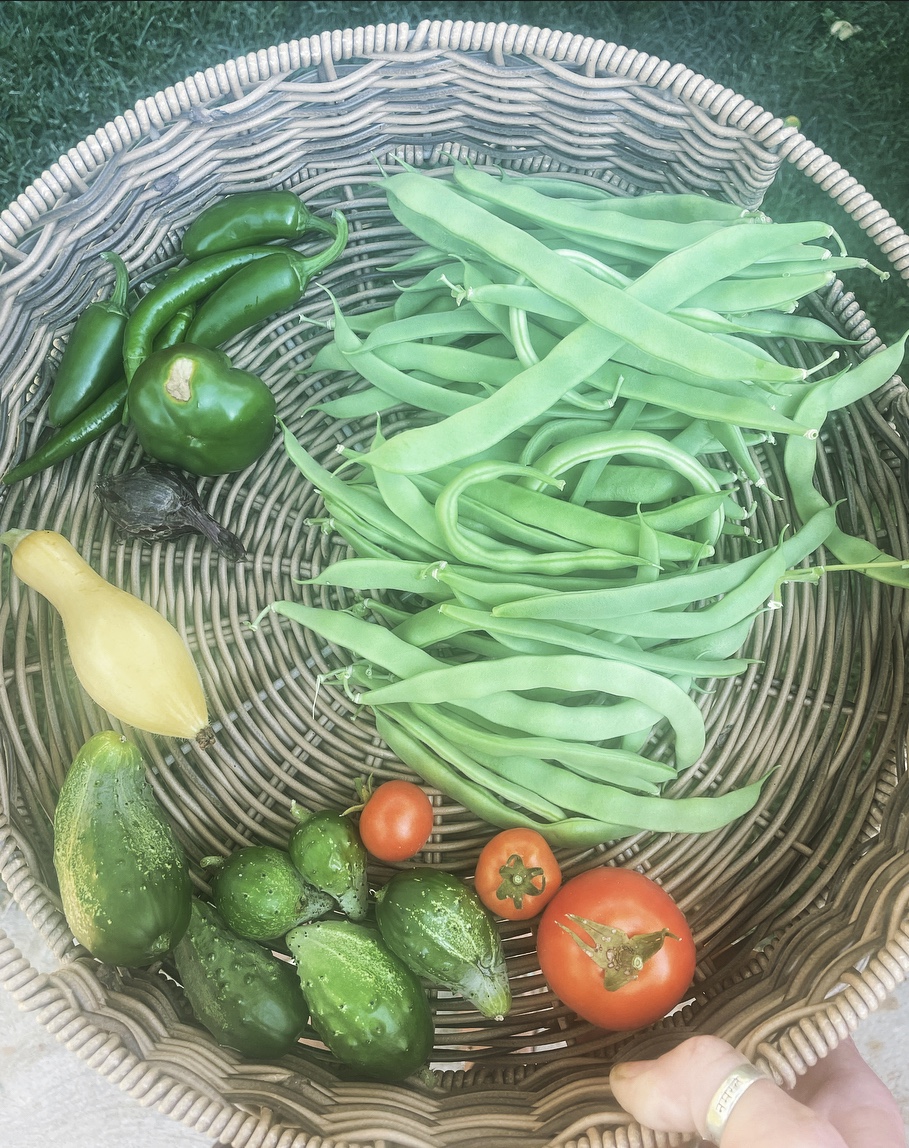Do you garden? When I first started growing veggies I didn’t have any confidence in my abilities so I started super small. I mostly grew things in pots and it was easy and fun. Each year since then I have expanded into more and more and now have a full size garden that grows many, many things.
There is truly something magical about growing your own food! Today I am going to freeze some beans, make pesto, pickle cucumbers and make salsa! How fun is that?
It is also in gardening that I feel so so connected and relaxed. After a long day of work there is just something so good about getting my hands in my plants, even if it’s just to check the progress. I also have found that still have a tendency to think in terms of scarcity and “not enough” mentality, so I over plant and thinking things won’t grow and end up with a crowded overly abundant garden. In some ways the garden reminds me that that I can continue to work on my thinking and personal development. Also, this year the raccoons have been enjoying digging things up which has been a little frustrating but the bounty is still coming in.
If you have not ever gardened, I say give it a try! A simple google search for you area or a handy book from your local library can get you started!
I have found that not only does spending time with my plants help my stress it also has an array of other benefits.
Planting flowers and vegetables can reap bountiful bouquets and delicious harvests for your dining table. But did you know gardening also can do wonders for your well-being? Here are eight surprising health benefits of gardening. Check this out:
1. Gardening can build self-esteem.
Maybe you don’t think you were born with a green thumb, but after tilling, planting, nurturing and harvesting plants, you might see a slightly different person in the mirror: a person who can grow things and is a little more in tune with the earth.
It always feels good to accomplish new tasks, and if you can grow a garden, what can’t you do?
2. Gardening is good for your heart.
All that digging, planting and weeding burns calories and strengthens your heart.
“There are physical benefits from doing the manual labor of gardening,” says UNC Health internal medicine physician Robert Hutchins, MD, MPH. “It’s hard work to garden, and it provides some cardiovascular benefit.”
3. Gardening reduces stress.
Gardening can help reduce symptoms of depression and anxiety.
“Gardening gives you a chance to focus on something and put your mind to work with a goal and a task in mind,” Dr. Hutchins says, “which is helpful especially now with so much illness and death and talk of death, just to see things growing and things thriving.”
4. Gardening can make you happy.
Getting dirt under your nails while digging in the ground can make you pretty happy. In fact, inhaling M. vaccae, a healthy bacteria that lives in soil, can increase levels of serotonin and reduce anxiety.
5. Gardening can improve your hand strength.
All that digging, planting and pulling does more than produce plants. Gardening also will increase your hand strength. What a great way to keep your hands and fingers as strong as possible for as long as possible.
6. Gardening is good for the whole family.
Gardening can be a solo activity or an opportunity for bonding with your family and friends. The happiness and stress relief that gardening provides is a great thing to share with loved ones. Also, gardening has special benefits for kids. Early exposure to dirt has been linked to numerous health benefits, from reducing allergies to autoimmune diseases. Plus, when they pull a carrot from the ground for the first time you will see pure happiness and awe.
7. Gardening can give you a boost of vitamin D.
A healthy dose of vitamin D increases your calcium levels, which benefits your bones and immune system. Exposure to sunlight helped older adults achieve adequate amounts of vitamin D. Just don’t forget your sunscreen.
8. Growing your own food can help you eat healthier.
If you have a vegetable or herb or fruit garden, you’re getting fresh produce that you know hasn’t been treated with pesticides.
“It’s essentially as farm-to-table as it gets,” Dr. Hutchins says, “if you’re eating what you’re growing.”
Are you ready to start planning next seasons garden?

